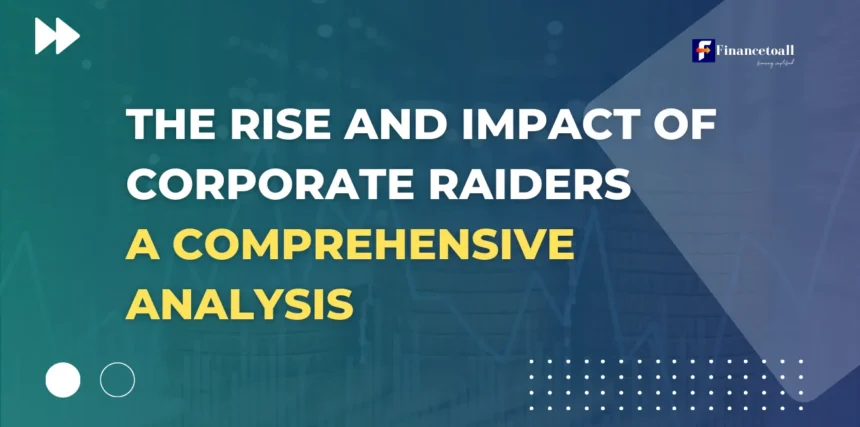Corporate raiders have long played a controversial role in the world of business and finance. Known for their aggressive and sometimes hostile tactics, these individuals or firms seek to profit from acquiring companies, often against the will of management. While their activities peaked during the 1980s, corporate raiders remain relevant in modern financial markets. This article will delve into the strategies, motives, famous figures, and the lasting impact of corporate raiders, providing a comprehensive understanding of their role in the corporate world.
What is a Corporate Raider?
A corporate raider is an individual or firm that buys a significant portion of a company’s shares, usually with the intention of gaining control. Unlike typical investors who seek long-term growth, corporate raiders often focus on short-term profits. Their primary goal is to restructure, break up, or sell off parts of the business to increase the value of their holdings, often at the expense of the company’s long-term future.
The term gained notoriety in the 1980s during the surge of hostile takeovers and leveraged buyouts. Corporate raiders differ from activist investors, who typically push for changes within a company to improve performance rather than dismantle it. The raider’s goal is often more financially motivated and less about the overall health of the business.
Strategies Employed by Corporate Raiders
Corporate raiders employ various tactics to achieve their goals. Some of the most notable strategies include:
Hostile Takeovers
A hostile takeover occurs when a corporate raider acquires a controlling stake in a company without the consent of its management. They often target companies they believe are undervalued or poorly managed. By gaining control, raiders can force changes, such as replacing the management team or selling off divisions to realize immediate gains.
Leveraged Buyouts (LBOs)
In a leveraged buyout, corporate raiders use borrowed money to finance the acquisition of a company. The raider uses the assets of the target company as collateral for the debt. After the acquisition, the raider often sells off parts of the company to pay down the debt, sometimes leaving the remaining business saddled with excessive liabilities.
Greenmail
Greenmail is a strategy where a raider buys a substantial amount of a company’s shares and then pressures the company to repurchase those shares at a premium to avoid a takeover. This allows the raider to make a quick profit without taking control of the company. While this practice has become less common due to legal restrictions, it played a prominent role in the corporate raiding boom of the 1980s.
Asset Stripping
Asset stripping involves purchasing a company and then selling its assets, such as real estate, divisions, or intellectual property, to generate cash. Corporate raiders often target companies with valuable assets that are worth more than the company’s stock price. This process can lead to short-term profits but may leave the company weakened or even dismantled.
Proxy Fights
In a proxy fight, corporate raiders attempt to gain control of a company’s board of directors by convincing shareholders to vote for their preferred candidates. This allows the raider to influence or control the company without owning a majority of shares. Proxy fights can be costly and time-consuming but are often effective in wresting control from entrenched management.
The Motives of Corporate Raiders
The primary motivation behind corporate raiders is profit. They seek out undervalued companies that they can acquire, restructure, and ultimately sell for a higher price. Some of the key reasons corporate raiders pursue these tactics include:
Exploiting Undervalued Companies
Corporate raiders often target companies they believe are undervalued by the market. By acquiring and restructuring these companies, raiders aim to unlock hidden value and sell their stake at a profit.
Breaking Up Conglomerates
In the 1980s, many large conglomerates were formed through a series of mergers and acquisitions. However, these conglomerates often became inefficient and unwieldy. Corporate raiders saw an opportunity to break them up, selling off individual units for more than the value of the whole company.
Enhancing Shareholder Value
While corporate raiders are often seen as predators, some argue that they improve shareholder value by forcing companies to operate more efficiently. By cutting costs, selling non-core assets, or replacing ineffective management, raiders can generate immediate returns for shareholders.
Short-Term Gains Over Long-Term Stability
Corporate raiders typically prioritize short-term profits over the long-term health of a company. While this can lead to quick gains for investors, it often leaves the company in a weakened position, making it more difficult to compete in the future.
Famous Corporate Raiders and Their Tactics
Several corporate raiders became household names during the 1980s and early 1990s. Their bold moves and hostile takeovers shaped the era of corporate raiding and continue to influence modern investment strategies.
Carl Icahn
Carl Icahn is perhaps the most well-known corporate raider. His takeover of TWA in 1985 is a textbook example of asset stripping. After acquiring TWA, Icahn sold its most valuable assets, including routes and aircraft, leaving the company struggling with debt. Icahn has since transitioned to more of an activist investor, but his legacy as a corporate raider remains.
T. Boone Pickens
T. Boone Pickens was a corporate raider who specialized in hostile takeovers of oil and gas companies. His most famous raid was his attempt to acquire Gulf Oil in 1984. While he ultimately failed to take control of the company, Pickens walked away with a significant profit after Gulf Oil was sold to Chevron.
Ronald Perelman
Ronald Perelman became famous for his leveraged buyout of Revlon in 1985. After acquiring the company, Perelman sold off several divisions, focusing on the core cosmetics business. The Revlon takeover is often cited as one of the most successful corporate raids of the 1980s.
Impact of Corporate Raiders on Target Companies
Corporate raiders have a profound impact on the companies they target, with both positive and negative consequences. Their actions can lead to improved efficiency and shareholder returns, but they can also result in job losses, asset stripping, and weakened companies.
Positive Effects
Corporate raiders often force companies to become more efficient. By cutting unnecessary costs and focusing on core operations, raiders can boost profitability and enhance shareholder value. In some cases, raiders replace ineffective management teams, leading to long-term improvements in performance.
Negative Effects
While corporate raiders may improve short-term profitability, their actions often come at a cost. Job losses are common, as raiders look to streamline operations and reduce expenses. In addition, asset stripping can leave companies without the resources they need to grow, making it difficult for them to compete in the long term. In extreme cases, corporate raids can lead to the complete dismantling of a company, leaving only the remnants of what was once a thriving business.
Defenses Against Corporate Raiders
Companies that find themselves in the crosshairs of a corporate raider often employ a variety of tactics to fend off hostile takeovers. Some of the most common defenses include:
Poison Pills
A poison pill is a strategy that allows existing shareholders to purchase additional shares at a discount, diluting the raider’s ownership stake and making it more expensive to acquire a controlling interest. Poison pills are a common defense against hostile takeovers, but they can also discourage potential investors.
White Knights
In some cases, a target company will seek out a more favorable buyer, known as a “white knight,” to rescue it from a hostile takeover. This allows the company to avoid falling into the hands of the corporate raider, while still benefiting from a merger or acquisition.
Golden Parachutes
Golden parachutes are lucrative severance packages given to top executives in the event of a takeover. These packages can make the company less attractive to raiders, as they increase the cost of the acquisition.
Pac-Man Defense
In the Pac-Man defense, the target company turns the tables on the corporate raider by attempting to buy the raider’s company. While rare, this aggressive tactic can force the raider to back down.
Legal and Regulatory Aspects
The rise of corporate raiders led to significant changes in laws and regulations governing hostile takeovers. Regulatory bodies like the Securities and Exchange Commission (SEC) play a critical role in ensuring that corporate raiders operate within legal boundaries.
Securities Exchange Act
The Securities Exchange Act of 1934 requires corporate raiders to disclose when they acquire more than 5% of a company’s shares. This transparency allows companies to prepare defenses against potential takeovers.
Anti-Takeover Laws
Several states have passed anti-takeover laws to protect companies from hostile raids. These laws often make it more difficult for raiders to acquire a controlling interest in a company without board approval.
The Ethical Debate
Corporate raiders have sparked heated debates over the ethics of their actions. Critics argue that raiders prioritize shareholder value over the interests of other stakeholders, such as employees, customers, and communities. By focusing on short-term profits, raiders can undermine a company’s long-term potential.
On the other hand, supporters of corporate raiders contend that they play a vital role in holding companies accountable. By targeting inefficient or poorly managed firms, raiders force companies to operate more efficiently, ultimately benefiting shareholders and the broader economy.
The Modern-Day Corporate Raider
While the era of traditional corporate raiders has largely passed, many of their strategies live on through modern financial institutions. Hedge funds, private equity firms, and activist investors often use similar tactics to unlock value in underperforming companies.
In the 21st century, activist investors like Bill Ackman and Nelson Peltz have taken up the mantle of corporate raiders, using their influence to push for changes in management, strategy, and capital allocation. While these investors are often more focused on long-term growth than their predecessors, their actions can still be seen as a continuation of the corporate raider playbook.
Conclusion
Corporate raiders have left an indelible mark on the world of business and finance. Through their aggressive tactics and focus on short-term profits, raiders have reshaped industries and forced companies to become more efficient. While their actions are often controversial, they have played a vital role in holding corporate management accountable and unlocking shareholder value.
As financial markets continue to evolve, the legacy of corporate raiders lives on through modern investors who seek to influence companies from within. Whether seen as predators or reformers, corporate raiders have forever changed the landscape of corporate governance and shareholder activism.
FAQ: Corporate Raiders
Q.1 What is a corporate raider?
A corporate raider is an individual or a firm that buys a significant portion of a company’s shares with the intent to gain control. They often aim to restructure the company for short-term profits by selling assets or taking other drastic measures, typically against the management’s wishes.
Q.2 How do corporate raiders make money?
Corporate raiders profit by acquiring undervalued companies and then implementing strategies such as selling off assets, cutting costs, or breaking up the business. They aim to increase the value of their shares, which they eventually sell for a profit.
Q.3 What is the difference between a corporate raider and an activist investor?
While both corporate raiders and activist investors seek to influence a company’s management, corporate raiders typically aim for short-term gains through aggressive tactics like hostile takeovers and asset stripping. Activist investors, on the other hand, push for changes to improve a company’s long-term performance, such as enhancing governance or improving operational efficiency.
Q.4 What is a hostile takeover?
A hostile takeover occurs when a corporate raider attempts to acquire a company without the consent of its management. This is usually done by purchasing enough shares on the open market to gain a controlling stake or by directly appealing to shareholders through a tender offer.
Q.5 What is greenmail?
Greenmail refers to the practice of a corporate raider buying a large stake in a company and then forcing the company to repurchase those shares at a premium to avoid a hostile takeover. The raider profits from the premium buyback without taking control of the company.
Q.6 What are leveraged buyouts (LBOs)?
A leveraged buyout (LBO) is a strategy where a corporate raider uses borrowed money, often secured by the target company’s own assets, to finance the acquisition. After the purchase, the raider usually sells parts of the company to pay off the debt, sometimes leaving the company with significant liabilities.
Q.7 What is asset stripping?
Asset stripping involves buying a company and selling its valuable assets, such as real estate, equipment, or divisions, to generate quick cash. This often leaves the remaining company weaker and less capable of competing in the market.
Q.8 Why are corporate raiders controversial?
Corporate raiders are controversial because their focus on short-term profits can result in job losses, broken-up companies, and weakened businesses. While they may increase shareholder value in the short term, their actions can undermine the company’s long-term stability and growth potential.
Q.9 How do companies defend against corporate raiders?
Companies use several defense mechanisms, including:
Poison Pills: Issuing new shares to dilute the raider’s ownership stake.
White Knights: Finding a more favorable buyer to take over the company.
Golden Parachutes: Offering lucrative exit packages to top executives if the company is taken over.
Pac-Man Defense: Turning the tables and attempting to buy the raider’s company.








